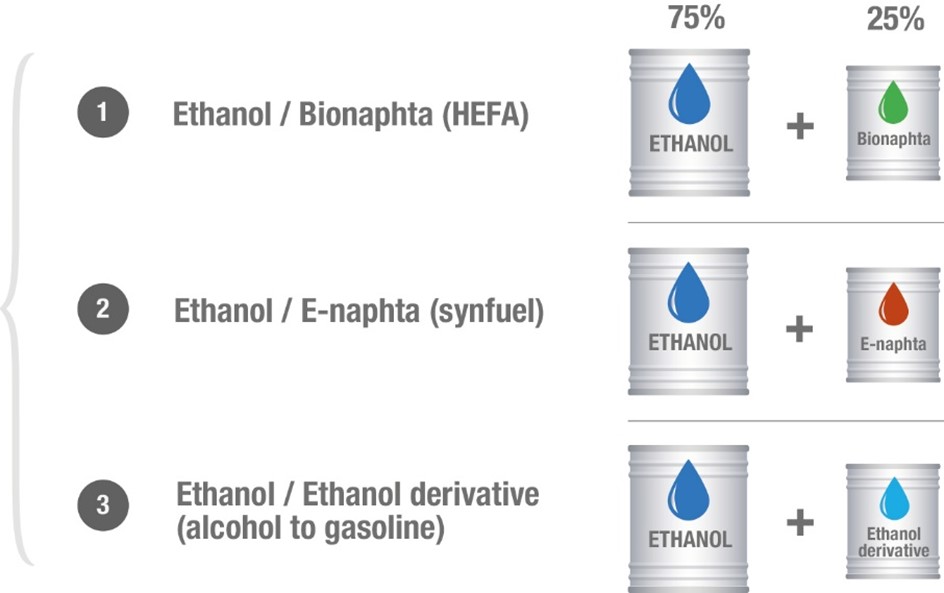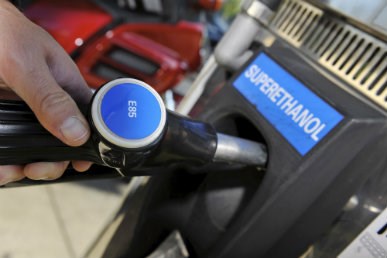Carbon-neutral fuel: New study shows 100% renewable Superethanol-E85 could replace fossil fuels
100% renewable Superethanol-E85 could act as an alternative to fossil fuels to cut back on CO2 emissions in road transport as well as emissions of regulated pollutants
In the run-up to the European elections in which the environment is a key debating issue, new research points to 100% renewable Superethanol-E85 as a viable replacement for fossil fuels to reduce carbon dioxide emissions produced by transport. While the European Union adopted a regulation in 2023 which would effectively prevent the sale of new cars emitting fossil-based CO2 from the tailpipe as from 2035, against the backdrop of concerns regarding all-electric vehicles, a window of opportunity remains open to define carbon-neutral fuels. The ethanol industry believes the scope of carbon-neutral fuels should include sustainable biofuels, provided it can be demonstrated that these solutions are as climate-friendly as all-electric solutions.
100% renewable Superethanol-E85, a new solution to reduce carbon dioxide emissions from transport, as beneficial as all-electric solutions
Research conducted by the Systems Simulations, Analyses & Experimentations Department within IFPEN’s Mobility & Systems Division tested three types of 100% renewable Superethanol-E85 mixing bioethanol with three types of renewable fuel, in a flex-fuel commercial vehicle compatible with E85.
These new findings show that, compared to the limits specified in current Euro 6 light passenger and commercial vehicle emissions standard, Superethanol–E85’s excellent performance was maintained and even improved with the new 100% renewable mixes. The research shows that Superethanol-E85 and these new mixes will meet the requirements of the new Euro 7 vehicle emissions standard, applicable as from late 2026.
An IFPEN paper published in 2022 showed that the environmental performance of plug-in hybrid vehicles running on 100% renewable Superethanol-E85 was at least equivalent to that of all-electric vehicles, especially for plug-in hybrid compact cars, depending on the type of use, in terms of total GHG emissions, when analysing the life cycle, both today and in 2040.
 In this 2024 study, the 25% share of fossil fuel was replaced by one of three renewable petrol-based fuels, either pure or in mixes:
In this 2024 study, the 25% share of fossil fuel was replaced by one of three renewable petrol-based fuels, either pure or in mixes:
- a petrol-type fuel obtained via the chemical transformation of ethanol: Ethanol To Gasoline (ETG)
- a base reproducing synthetic petrol which is a co-product of the future e-kerosene (at a ratio of 1 for 2) obtained via Fischer-Tropsch (FT, combining CO2 and renewable hydrogen)
- a base reproducing petrol type hydrogenated vegetable oil (HVO), a co-product (at a ratio of 1 for 4) of the existing aviation fuel HEFA biokerosene.
 Given concerns regarding all-electric solutions and in synergy with mobility needs in various industries (aviation, shipping and haulage), 100% renewable Superethanol-E85 is an additional solution helping to eliminate the need for fossil fuel in new vehicles post 2035. Combining bioethanol and petrol type hydrogenated vegetable oil (HVO), 100% renewable Superethanol-E85 is already available in California where it accounts for a third of the volumes of E85 sold. It could be deployed in France ahead of the 2035 deadline.
Given concerns regarding all-electric solutions and in synergy with mobility needs in various industries (aviation, shipping and haulage), 100% renewable Superethanol-E85 is an additional solution helping to eliminate the need for fossil fuel in new vehicles post 2035. Combining bioethanol and petrol type hydrogenated vegetable oil (HVO), 100% renewable Superethanol-E85 is already available in California where it accounts for a third of the volumes of E85 sold. It could be deployed in France ahead of the 2035 deadline.
 The Collective du Bioéthanol: “Aiming for net zero by 2050 for automotive transport is possible but the equation absolutely must include solutions for cars on the roads today and for new vehicles. Even after 2035, French and European motorists should be able to choose from a range of solutions and technologies, provided they have all been proven climate friendly. Bioethanol is the main alternative to fossil fuels to reduce carbon dioxide emissions from thermal injection and hybrid cars on the roads today, which will continue to run for several years after 2035, and as fuel for new vehicles sold after 2035, in 100% renewable Superethanol.”
The Collective du Bioéthanol: “Aiming for net zero by 2050 for automotive transport is possible but the equation absolutely must include solutions for cars on the roads today and for new vehicles. Even after 2035, French and European motorists should be able to choose from a range of solutions and technologies, provided they have all been proven climate friendly. Bioethanol is the main alternative to fossil fuels to reduce carbon dioxide emissions from thermal injection and hybrid cars on the roads today, which will continue to run for several years after 2035, and as fuel for new vehicles sold after 2035, in 100% renewable Superethanol.”
Maintaining the availability of hybrid vehicles fitted with combustion engines will be an indispensable outlet for renewable fuels generated by the production of sustainable aviation fuels (HEFA already available and future synfuels), required by EU regulations. The mixing of these renewable fuels with ethanol in Superethanol-E85 will help to consolidate the economic viability of sustainable aviation fuels.
The definition of carbon-neutral fuels is being discussed in Brussels. The French bioethanol industry is appealing to political decision-makers for the scope of carbon-neutral fuels to include not only synfuel as requested by Germany but also biogas, biodiesel and bioethanol, for which France is the top producer Europe-wide.
Download the full presentation on the IFPEN study (in French) here.
